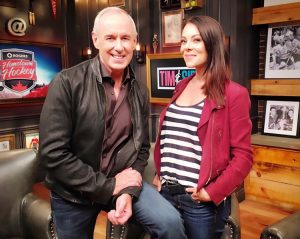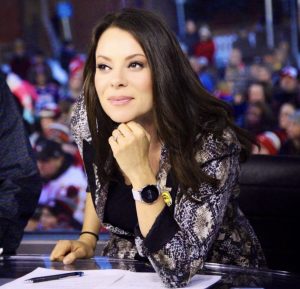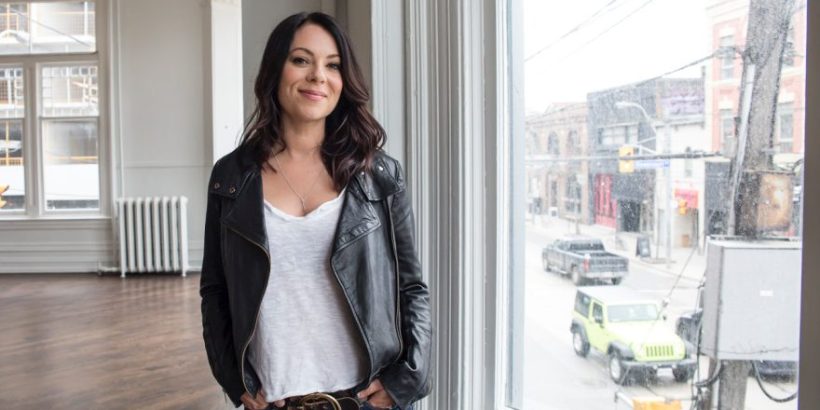When I watch someone on television, like Tara Slone, I often ask myself if the person I see and connect with on the small screen is the same in person if I were to meet on the street or are they in character or playing a role on screen. Well, when it comes to Tara, she is the real deal, what you see, is what you get. Slone who was born in Montreal, raised in Nova Scotia and now lives in Ontario and is as genuine as they come. We had the opportunity to chat with Tara before she hit the road for this season of Rogers Hometown Hockey to talk about her professional journey. Spoiler alert, no one is more surprised than Slone herself about where her career path has taken this talented Juno-nominated vocalist, Actor, Producer and Television Personality and she looks forward to what the future might hold.
~
 Spotlight: Tell us a little about yourself as there may be a few readers that might not know who you are and your ties to Nova Scotia?
Spotlight: Tell us a little about yourself as there may be a few readers that might not know who you are and your ties to Nova Scotia?
Tara Slone: Well, I was born in Montreal and moved with my Mom and my Stepdad to Nova Scotia when I was 7 years old. My family and I lived in Wolfville for about 4 years but ended up living in the Valley and I ended up going to High School in Halifax. I had a very short stint at Dalhousie, but eventually moved away for university and ultimately ended up at Concordia back in Montreal. My Father still lives in Nova Scotia and lots of my friends either stayed or have moved away but have now come back home to Nova Scotia, so I still have a very strong connection to the province.
Spotlight: What do you like to do in your spare time when you are not in front or behind the camera if you have any?
 Tara Slone: Yeah I guess I don’t have a lot of spare time these days although I did have a very nice summer and I did get the chance to spend some of it in Nova Scotia. For me it is really about relaxing because my life feels so busy and so frenetic so for me, I actually love to hang out with my daughter. She is actually at an age where she is nice to me, she is a preteen, so I am kind of holding my breath waiting for the teen years to drop, but I really do enjoy the simple things now. I enjoy being home, I enjoy listening to music. I really love to sing because that is my first love, and I don’t do it professionally anymore. I love seeing friends for dinner and sitting outside since space has become much more of a priority for me than it ever was before.
Tara Slone: Yeah I guess I don’t have a lot of spare time these days although I did have a very nice summer and I did get the chance to spend some of it in Nova Scotia. For me it is really about relaxing because my life feels so busy and so frenetic so for me, I actually love to hang out with my daughter. She is actually at an age where she is nice to me, she is a preteen, so I am kind of holding my breath waiting for the teen years to drop, but I really do enjoy the simple things now. I enjoy being home, I enjoy listening to music. I really love to sing because that is my first love, and I don’t do it professionally anymore. I love seeing friends for dinner and sitting outside since space has become much more of a priority for me than it ever was before.
Spotlight: We understand that from a young age you wanted to become an opera singer. So what made you decide to leave a scholarship at Dalhousie University’s music program and head to Toronto to focus on acting and rock music?
 Tara Slone: I loved classical music when I was a kid. I was just drawn to it and I loved singing in choirs and my voice lent itself to that style very well. I started at a pretty young age taking voice lessons and did that all through high school and that was to be my career or at least I thought. But obviously when I got to Dalhousie it became really apparent to do a discipline like that you have to love something deeply because it requires so much work and it is not an easy field to get into, to excel in and I just simply did not have the discipline at that age. I was 18 years old, and I wanted to be with all my friends doing fun stuff at my first year of university, so I moved my focus to theatre which is what I did at Concordia University, but obviously music was in my blood and a rock career came calling fortunately. I will always be grateful for the years of training that I did with classical voice because it taught me the importance, and the knowledge of how to use my voice properly. Learning how to properly warm up and warm down is really what kept me from never losing my voice on the road. I never missed a show or had vocal trouble, so I credit it to that.
Tara Slone: I loved classical music when I was a kid. I was just drawn to it and I loved singing in choirs and my voice lent itself to that style very well. I started at a pretty young age taking voice lessons and did that all through high school and that was to be my career or at least I thought. But obviously when I got to Dalhousie it became really apparent to do a discipline like that you have to love something deeply because it requires so much work and it is not an easy field to get into, to excel in and I just simply did not have the discipline at that age. I was 18 years old, and I wanted to be with all my friends doing fun stuff at my first year of university, so I moved my focus to theatre which is what I did at Concordia University, but obviously music was in my blood and a rock career came calling fortunately. I will always be grateful for the years of training that I did with classical voice because it taught me the importance, and the knowledge of how to use my voice properly. Learning how to properly warm up and warm down is really what kept me from never losing my voice on the road. I never missed a show or had vocal trouble, so I credit it to that.
Spotlight: Tell us about what led to you becoming the lead vocalist of the Canadian alternative rock band Joydrop?
 Tara Slone: Well I moved to Toronto, believe it or not, in search of acting and jobs in theatre and film, but again the itch I needed to scratch was music so I was looking in a weekly magazine, called Now Magazine, at the classifieds in the back of the issue, like they used to have and was hoping to find some people to play music with and there was an ad that said, ‘looking for a rock goddess in an already established band contact, Tony.’ So, I thought I guess I could be a rock goddess, I don’t know, and I called and really it was instant chemistry. I loved the guys, and I loved the music they already created. I knew that their style was something that I would blend in well with and could add to. Really it all happened incredibly fast and ran until the end of 1996 and in the summer of 1997, we had a record deal in play, so we were very lucky.
Tara Slone: Well I moved to Toronto, believe it or not, in search of acting and jobs in theatre and film, but again the itch I needed to scratch was music so I was looking in a weekly magazine, called Now Magazine, at the classifieds in the back of the issue, like they used to have and was hoping to find some people to play music with and there was an ad that said, ‘looking for a rock goddess in an already established band contact, Tony.’ So, I thought I guess I could be a rock goddess, I don’t know, and I called and really it was instant chemistry. I loved the guys, and I loved the music they already created. I knew that their style was something that I would blend in well with and could add to. Really it all happened incredibly fast and ran until the end of 1996 and in the summer of 1997, we had a record deal in play, so we were very lucky.
Spotlight: Some say that the breakup of Joydrop led to your appearance on television for the first season of the reality television show Rock Star competing to become the lead vocalist for the Australian rock band INXS. But our research tells us that you were in front of the camera even before Joydrop formed. Can you tell us how your early experience in front of the camera led to your landing the co-host spot on Breakfast Television Calgary in 2010?
 Tara Slone: Being a member of Joydrop gave me the opportunity to do music videos and make lots of appearances on radio and on tv. Plus, I had done a bunch of acting so I had done some episodic television work in some movies so tv wasn’t so foreign to me. Although, I have to say being part of the show, Rock Star, in 2005 was extreme. Not only was it a major U.S. network show on CBS, but a Mark Burnett show (the guy behind creating and producing reality shows like, The Apprentice, Shark Tank and Survivor). So, it was at a whole different level for me and to be honest the whole thing was kind of blinding to me. It was a unique experience, and I know now that there is nothing that you can do to truly prepare you for being on a reality show like that or any one for that matter.
Tara Slone: Being a member of Joydrop gave me the opportunity to do music videos and make lots of appearances on radio and on tv. Plus, I had done a bunch of acting so I had done some episodic television work in some movies so tv wasn’t so foreign to me. Although, I have to say being part of the show, Rock Star, in 2005 was extreme. Not only was it a major U.S. network show on CBS, but a Mark Burnett show (the guy behind creating and producing reality shows like, The Apprentice, Shark Tank and Survivor). So, it was at a whole different level for me and to be honest the whole thing was kind of blinding to me. It was a unique experience, and I know now that there is nothing that you can do to truly prepare you for being on a reality show like that or any one for that matter.
Honestly Rock Star in itself did not do anything for my music career but it 100% opened the door for my television career. I hadn’t even contemplated a career in broadcasting before that, but because I was the first Canadian eliminated, there were four other Canadians on that show out of fifteen contestants. However, because I was the first Canadian eliminated I became the go to for some of the Canadian entertainment outlets to talk about the show and weigh in on the remaining contestants so, I got to do a whole bunch of tv and I hosted a couple of things through that, which really opened my eyes to potential opportunities and gave me some options when I decided that I wanted to move over into something different. So that show wasn’t what I expected it to be, but it really transformed what my life became.
Spotlight: Interesting how that happens in life.
 Tara Slone: It is, I almost didn’t do that show and you know I really came very close to saying No so I am glad I did it.
Tara Slone: It is, I almost didn’t do that show and you know I really came very close to saying No so I am glad I did it.
Spotlight: It has probably opened a lot more opportunities as well now when you are positioned with projects, as you have that inner voice saying, what if I had of said no to Rock Star, it might not have opened your horizons for other opportunities.
Tara Slone: Yeah exactly!
Spotlight: Tell us about landing the Rogers Hometown Hockey gig and what it is like to travel across Canada, celebrating and having the opportunity to share local hockey stories? Why do you think the broadcast is so popular among viewers?
Tara Slone: My first job on tv was at a very small station and it was focusing on entertainment and then I moved to the morning show, Breakfast Television, in Calgary which I did for 5 years which encompassed a broad array of topics.
I knew when I first went into tv that I didn’t necessarily want to stay in entertainment and I wanted sports to be a part of what I did in some way and I started to steer myself towards that and fortunately enough the Breakfast Television show was on City TV which is owned by Rogers, Rogers owns Sportsnet and so there was a connection there with programming communications. So, when Rogers Hometown Hockey was announced as a show, I read the press release and I thought that is something that I want to be a part of because I love hockey. I knew that I did not have the experience to be a hockey analyst, or do the play by play in the booth, but I do love storytelling and that I wanted to be part of sharing hockey stories from local heroes from all across Canada. So, I actually sent an email and quite a compassionate letter to Sportsnet saying here is why I think that I should be part of this and spent three or four months trying to convince them that I was qualified for the job and ultimately was brought on board from day one.
It has been a real gift to cross the country. It has been such a learning experience. It has been such a privilege to have people trust us with their stories, so I feel really blessed.
It is going to be nice to get back on the road after this long break. I think people are really craving connection. Obviously, everything they do at this point has to be covid safe, so it is not going to look exactly like it did before, but I think you know it is a really unique show and we tell the stories that you do not see on every other hockey broadcast so I am glad we get to do it again.
I think the first thing is that everybody is proud of where they come from. Everybody from octogenarians to hockey superstars and kids. I mean we are all proud of our hometowns and where we come from. I mean just the way I talk about being from Nova Scotia. So, to have that expressed out to the rest of the nation and you know we really do our best to share some of the aspects of all these communities. So that is what I think is the number one appeal of the show. I think the fact that it is a live event from the festival perspective and the broadcast perspective is really fun. We are able to focus on smaller, seemingly smaller things. We can talk about a senior hockey team from 1958 that won a cup, but it doesn’t get touched on in bigger NHL broadcasts, but I think people locally really appreciate that stuff because yeah, we are known for that, so I really think on a bigger scale it highlights people’s sameness at the same time as highlighting people’s differences, if that makes any sense. You know, I think we have similar passion for connection, for hockey for rooting for and also for rooting against hometowns, for our countries, but then everyone is an individual and also wants to be treated as such and I think hometown hockey does a good job of combining all of these things.
Spotlight: What is it like to work with a veteran sports commentator and iconic broadcaster like Ron MacLean?
 Tara Slone: I mean I don’t think calling Ron a legend is hyperbole at all. He has been doing this for over three decades and has become truly embrained in not just the hockey culture of this country, but I think the national identity we know. He is who he is for a reason. He is an icon because he is so good at what he does but also because he is so invested in people, and I think people see that authenticity. I mean he is an incredible broadcaster, and he has an incredible memory. I mean he has been everywhere and tends to remember everyone and everything and that is really special to people. He makes people feel very special. For me there are some things that Ron does that you can’t learn because it is just Ron. I mean I am never going to have the kind of memory that he does. You just can’t learn that. I have certainly learned a lot by being curious and being engaged and Ron knows how to make people feel special. Obviously there really is no better education and he has been very kind to me.
Tara Slone: I mean I don’t think calling Ron a legend is hyperbole at all. He has been doing this for over three decades and has become truly embrained in not just the hockey culture of this country, but I think the national identity we know. He is who he is for a reason. He is an icon because he is so good at what he does but also because he is so invested in people, and I think people see that authenticity. I mean he is an incredible broadcaster, and he has an incredible memory. I mean he has been everywhere and tends to remember everyone and everything and that is really special to people. He makes people feel very special. For me there are some things that Ron does that you can’t learn because it is just Ron. I mean I am never going to have the kind of memory that he does. You just can’t learn that. I have certainly learned a lot by being curious and being engaged and Ron knows how to make people feel special. Obviously there really is no better education and he has been very kind to me.
Spotlight: Can you tell us about your latest project, “Top of HER Game,” on Sportsnet?
Tara Slone: Well, ‘Top of HER Game’ is currently on pause as we try to figure out what the next steps are. Top of HER Game is a female focused series with women in sports specifically from athletes to builders and role models of all kinds. It was, I hate to say it, but it was born out of the pandemic and the pause on live sports really highlighted for me the fact that there is no conversation surrounding women in sport. We know that statistically only 5% of sport coverage is devoted to women’s sports. That data, kind of hit us all hard, but what was amazing was the program was created as an opportunity to focus on something new and it was only supposed to be six episodes but we have shot over forty now and the brand will continue and I just think it is super important to continue to talk about these stories and talk about the quality of sport, the athleticism and the systemic problems. I mean there is so much when you talk about women in sports that doesn’t get typically spotlighted in a mainstream way and we are looking to change that.
Spotlight: Speaking of putting the spotlight on the lives and careers of some of sport and culture’s fearless females. What mentors did or do you have now? You inspire many, but who inspires you and why?
 Tara Slone: Oh wow, well I mean thinking that music was my first love, I looked up to a lot of singers and rock stars and so I would say my first role models in life were people like Chrissie Hynde and Debra Harry and Annie Lennox, even Madonna. I didn’t really like Madonna when I was young, but I knew what she was doing was important as a woman. Then of course there are always tons of male musicians to look up to, Bowie for me was always a big one. I do think that it had to do with that he was just totally him. He morphed into a million different things.
Tara Slone: Oh wow, well I mean thinking that music was my first love, I looked up to a lot of singers and rock stars and so I would say my first role models in life were people like Chrissie Hynde and Debra Harry and Annie Lennox, even Madonna. I didn’t really like Madonna when I was young, but I knew what she was doing was important as a woman. Then of course there are always tons of male musicians to look up to, Bowie for me was always a big one. I do think that it had to do with that he was just totally him. He morphed into a million different things.
Personally, I am lucky I have a really great and supportive family. I mean I was always able to soak that in and always given a lot of wisdom.
In the tv realm I would credit Michael Landsberg with quite a bit. Michael had a sports talk show called ‘Off the Record,’ I am sure you remember it was on the air for over two decades and I was on that show when I was in Joydrop. I was one of a few women that they would call routinely to have a conversation about work even though I was a rock singer and I started actually doing some web consulting for them but again I was still a rock singer with no broadcast aspirations but when I started thinking of moving into broadcasting as a career Michael was the one who helped me compile my first demo reel, gave me lots and lots of great advice and continued to give me great advice throughout my career and not just about tv but Michael was very open about his journey with mental health and I had a period of where I had panic attacks on tv and was suffering from pretty debilitating nerves so he really helped me with that as well. I give him a lot of credit.
Spotlight: What advice do you have for females or any readers for that matter when it comes to getting into the entertainment industry, whether it is in front of behind the microphone or camera?
Tara Slone: I was lucky to learn on the job and I really think that was the best education but certainly there are so many fantastic school programs, but I think that times have changed to the point that if you are really interested in broadcasting I didn’t study is a huge part of it but I also think that we are in an era now where you can make your own content. I think that the world is maybe your oyster in a way that it didn’t used to be. Not everybody could pick up editing equipment twenty years ago but right now everyone has a smartphone so I would say if you were really looking to get into it start creating your own projects and content. Do a podcast, do social media stream, do something. Other advice I give is make sure you are passionate about it. I think that the key to connection and longevity in this business is curiosity and authenticity plus you have to be sometimes willing to go work in that place you know that isn’t necessarily a primary market. Lots of my colleagues have gone to places like Grand Prairie or Lethbridge and other small towns and markets all over Canada to get their opportunity in front of the camera.
If you want to be in this industry, if you really think you want to be in broadcasting you have to really be dedicated to it and be passionate and curious about humanity. I would say this to anyone looking to get into any field, don’t be afraid to reach out to others, this is a very connected world and places like Linkedin and many of the other social media platforms allow you to connect with those in the industry. Don’t be afraid to ask somebody that you admire if they can chat with you. I am not encouraging everyone to do this, but I will be honest I get a bunch of unsolicited messages saying, “Hey I am a student in college I want to get into broadcasting, can we talk for 15 minutes” and most people I know will say yes. So, reach out, ask questions and don’t be afraid to ask for support in the media because it is nice to have different perspectives.
Spotlight: What is the biggest lesson you have learned along the way in your professional journey? What was your biggest surprise? What was your biggest disappointment?
Tara Slone: I think I learned it all comes back to the same thing. It all comes back to authenticity. Sometimes we all get caught up in needing to fit a certain mold, some way that we think we are supposed to be especially in broadcasting because there seems to be a broadcast voice and a broadcast look. For me it is about breaking the mold, it is learning about me and how I can evolve and that my individuality is my superpower. Honestly, it is everybody’s superpower in that we are not meant to be robots and I don’t think that people out there watching us and listening to us want robots, they want to connect with the real you. So, I think that is the biggest lesson for me that I still need to be reminded of every once in a while.
I think getting into broadcasting at all was my biggest surprise as it really wasn’t an aspiration of mine. But now I still have pinch me moments when I am on the road and you know introducing a Toronto Maple Leafs game, and think to myself, like what the hell is this, it is like what world has this come to fruition, so I think that is the biggest thing for me.
I don’t know about disappointing. I mean if you really want to go into sort of initial my time with Joydrop did not go or end the way we wanted it to. We had the rug pulled out because our record company was absorbed into another, and we lost our record deal right when we were starting to take off so I mean that for all of us remains a huge disappointment because we had a ton of momentum and that will always be a what if. I mean I can’t say that I can express any disappointments in the way that my broadcast career projectory has gone. I feel super fortunate and yeah, I am crazy lucky. So, I mean sure are there always things that I could have done differently, yes but I would say the record company thing was probably the biggest disappointment.
Spotlight: We couldn’t end our conversation without asking if there are any chances of another Joydrop reunion any time soon?
Tara Slone: Well, up until a couple years ago we were doing one concert a year in Toronto, and we actually did get together this summer and started working on a new song, so I mean the chances are good. I think we would love to finish a few songs and put them out. We, three of the four of us, are still really close and are committed to keeping it alive to some extent.
by Lee Ann Atwater

